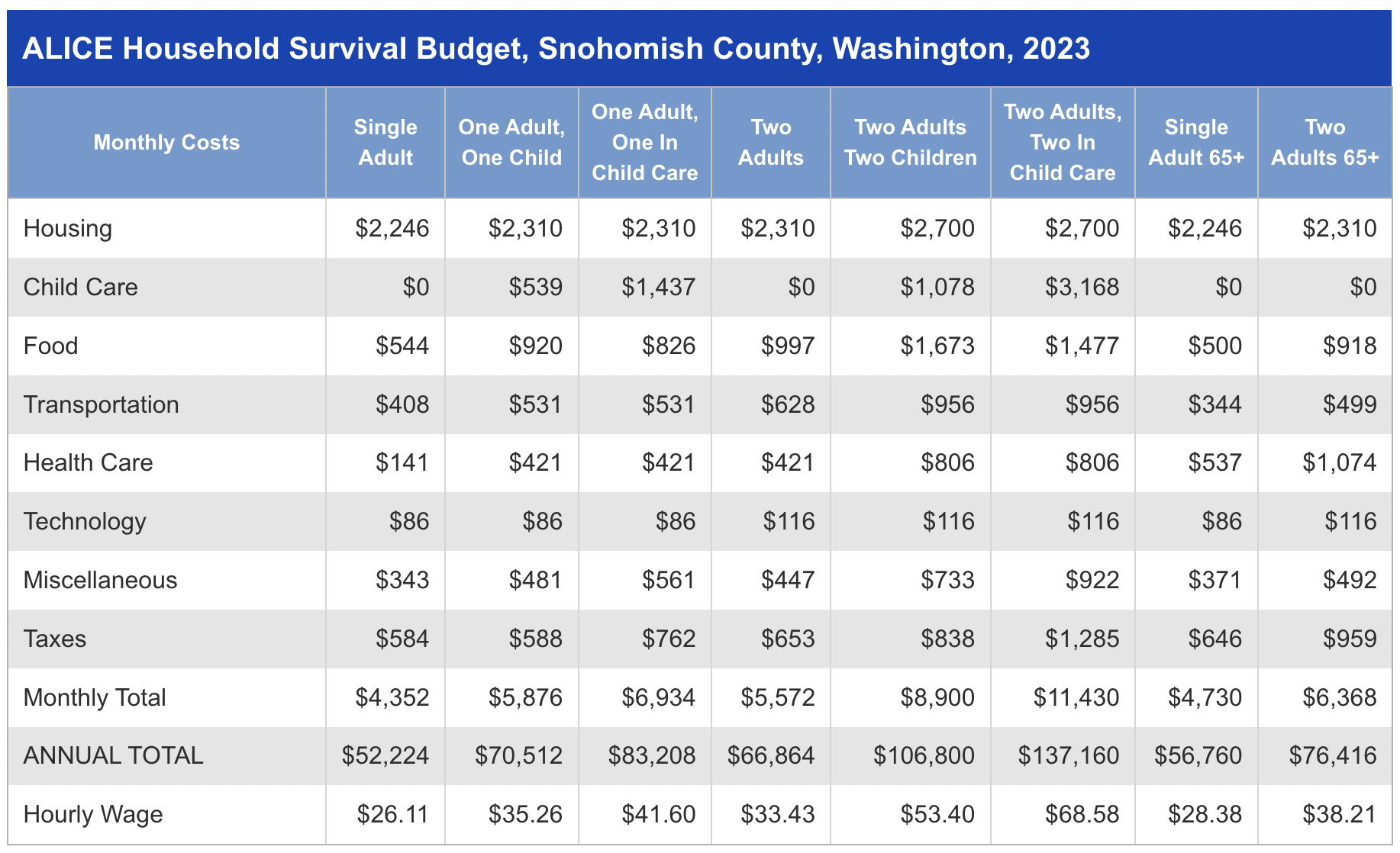
A Truer Picture of Financial Hardship in Snohomish County
In 2023, based on the Federal Poverty Level (FPL), 10% of Washington households were defined as living in poverty. Yet this measure failed to account for an additional 28% of our state’s households — nearly three times as many — that were also experiencing financial hardship.
These households are ALICE: Asset Limited, Income Constrained, Employed — with income above the FPL, but not enough to afford basic expenses in the county where they live.
Between ALICE households and households living in poverty, an estimated 38% of households in Washington were below the ALICE Threshold in 2023. Placing Washington 15th among all 50 states and the District of Columbia.
Households below the Threshold are forced to make impossible choices — like deciding whether to pay for utilities or a car repair, whether to buy food or fill a prescription.
40% of Households in Snohomish County below ALICE Threshold
In 2023, of Snohomish County’s 321,835 households:
- 9% (28,965) were below the Federal Poverty Level (FPL)
- 31% (99,769) were ALICE (Asset Limited, Income Constrained, Employed)
- For a combined 40% (128,734) of households in Snohomish County were below the ALICE Threshold
In 2023, of Washington’s 3,094,073 households:
- 10% (320,701) were below the Federal Poverty Level (FPL)
- 28% (854,530) were ALICE (Asset Limited, Income Constrained, Employed)
- For a combined 38% (1,175,231) of households in Washington were below the ALICE Threshold
Basic Costs: The ALICE Household Survival Budget
At the heart of ALICE’s struggle is a simple but devastating mismatch: The cost of basics keeps rising, but wages aren’t keeping up.
In Snohomish County in 2023, the ALICE Household Survival Budget was:
- $52,224 for a single adult
- $106,800 for a family of four with two adults and two school-aged children — 3.5 times the FPL
- $137,160 for a family of four with two adults and two in childcare — 4.5 times the FPL
In Washington in 2023, the ALICE Household Survival Budget was:
- $32,436 for a single adult
- $109,500 for a family of four with two adults, an infant, and a preschooler
That’s much higher than the Federal Poverty Level of $14,580 for an individual and $30,000 for a family of four.
Input your details to calculate your household's survival budget, HERE!
Who is ALICE?
- ALICE® stands for Asset Limited, Income Constrained, Employed. ALICE households have income above the Federal Poverty Level but still don’t make enough to afford the basics in the counties where they live.
- ALICE is the engine that powers our economy. ALICE workers are typically our child care providers, home health aides, delivery drivers, grocery store cashiers, and other essential workers we rely on every day. ALICE can also be a family member, friend, neighbor, or even colleague.
- ALICE is often locked out of public assistance. Why? Despite ALICE living paycheck to paycheck, in many cases ALICE workers earn too much to qualify for support.
- Each day brings a new impossible choice for ALICE families, mired in a constant battle to make ends meet. Pay my heating bill, or buy healthy food for my family? Pay for child care, or work reduced hours to stay home with my child?
- ALICE lives in every community, in every county nationwide. Financial hardship isn’t just a big-city or rural problem – it's everywhere.
- ALICE isn’t giving up. Despite the odds, these individuals and families are resilient. ALICE works hard, yet is trapped by systemic barriers that stand in the way of getting ahead.
United For ALICE
United for ALICE, a national research organization led by United Way of Northern New Jersey whose work is backed by more than 300 experts nationwide, has given us a name and a way to quantify this population that is often known as the “working poor” or the “invisible.”

